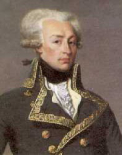Important days
4. 9. 2009
Declaration of Human and Civic Rights
Declaration
After the establishment of the National Constituent Assembly, on 9 July 1789, and after the conquest of the Bastille five days later, when the National Assembly issued so called August Decrees through which the existing social system was removed. Several days later, on 26 August, the National Assembly issued the Declaration of Human and Civic Rights. It was Gilbert du Moties, the marquis de Lafayette who was greatly involved in the preparation and the content of the declaration. He was a French aristocrat who participated in the American War for Independence and he was also a good friend of George Washington. He also participated in the preparation of the United States Declaration of Independence and he brought a copy of the declaration to France. Also the new French Constitution of 1791, which guaranteed equality of citizens, freedom of speech and the right of ownership, is based on the Declaration of Human and Civic Rights. After the Constitution adoption by Louis XVI, the France became formally a constitutional monarchy.
The Declaration became a key document for later definitions of human rights and a basis of democracy as it is known nowadays. Certain principles that we regard as indisputable were declared in the document for the first time. The declaration contains human rights which are declared as natural, inalienable and sacred; men are born and remain free and equal in rights. Natural and imprescriptable rights are liberty, property, safety and resistance to oppression. The principle of sovereignty lies primarily in the Nation. Human liberty consists in being able to do anything that does not harm others; restrictions of these freedoms may be determined only by Law.
The Law is the expression of the general wills, it has the right to forbid only those actions that are injurious to society. All citizens have the right to take part, personally or through their representatives in its making. All citizens are equal before the Law. Every man is presumed innocent until he has been declared guilty. The Declaration guarantees freedom of worship, freedom of speech ("any citizen may speak, write and publish freely") and also the right to property, which is, according to the Declaration, inviolable and sacred right and no one may be deprived of it.
Human Rights
The history of human rights concerns the development of relations between individuals and the state – royal, religious power. Inequalities and unequal position of men in society were anchored by medieval society in the form of serfdom and thraldom.
Christianity contributed to the idea of human rights through its concept of moral equality of men with the accent to human personality. In the course of the reform movement claims for free interpretation of the Holy Scripture emerged, and later on it concerned also claims for freedom of worship and conscience. It was the Czech reform movement which played a significant role in that period. The right to resistance to ruler who would betray God was derived from these freedoms. The first important document in the development of human rights was the English Magna Carta Libertatum (the Great Charter of Freedoms) of 1215 which concerned restrictions of powers of the king by English barons.
As early as in the Enlightenment period the idea of inviolable and natural rights emerged; such rights would belonged to all men on account of their humanity, that would be independent on rulers and legislation in force because they had been established even before the establishment of the state, in fact. The interest in human rights was increasing in the 18th century. The bases of all modern declarations on human rights are the United States Declaration of Independence of 1776 and the French Declaration of Human and Civic Rights of 1789. Both declarations are based on a thesis that people are natural owners of rights that are independent on the state power; such rights exit independently on the state.
In the 20th century, when two world wars and two big totalitarian systems drew the people's attention to the mutual relations between peace and observance of human rights and their trampling, an urgent need to consistently protect human rights emerged. The basic document which stipulates the existing concept of human rights is the Universal Declaration of Human Rights adopted on 10. December 1948, containing not only articles on right to life, liberty and security of person, equality before the law, right to free movement and residence, property rights, rights to freedom of thought, conscience and religion, right to vote, ban of slavery, torture and cruel or degrading treatment, property rights, also the right to work, right to just remuneration, right to rest and leisure, to adequate standard of living, to security in the event of unemployment, old age and such like. On the occasion of its proclamation was 10th December declared as the International Human Rights Day.
It is the Commission for Human Rights of the UN in Geneva which monitors human rights. A significant role also plays the Council of Europe seat of which is in Strasbourg. The European Convention for the Protection of Human Rights and Fundamental Freedoms of 1950 was a basis for the establishment of the European Court of Human Rights. Great number of independent organizations is involved in the human rights protection. The Amnesty International and the Human Rights Watch are the most well-known non-governmental organization.
The Government Representative for Human Rights prepares for the government of the Czech Republic long-term concepts relating to human rights issues. In cooperation with the section of Human rights of the Office of the Government, he works out proposals for the individual measures and suggestions aimed at improvement of human rights observance. He chairs the Government Council of Human Rights and as the First Deputy Chairman he is involved in the work of the Inter-ministerial Commission for Romany Community Affairs. He also cooperates with the public administration bodies, non-government organizations and experts in the field of human rights protection and Romany community social inclusion.
Zdroje:
David, Roman: Politologie. Nakladatelství Olomouc. 2002
http://cotoje.cz
http://cs.wikipedia.org/wiki/Deklarace_práv_člověka_a_občana
http://www.historie.upol.cz/19/prameny/prava.htm
http://europa.eu/pol/rights/overview_cs.htm
http://www.osn.cz/lidska-prava
http://www.vlada.cz/cz/pracovni-a-poradni-organy-vlady/zmocnenec-vlady-pro-lidska-prava/cinnost/zmocnenec-15656/









